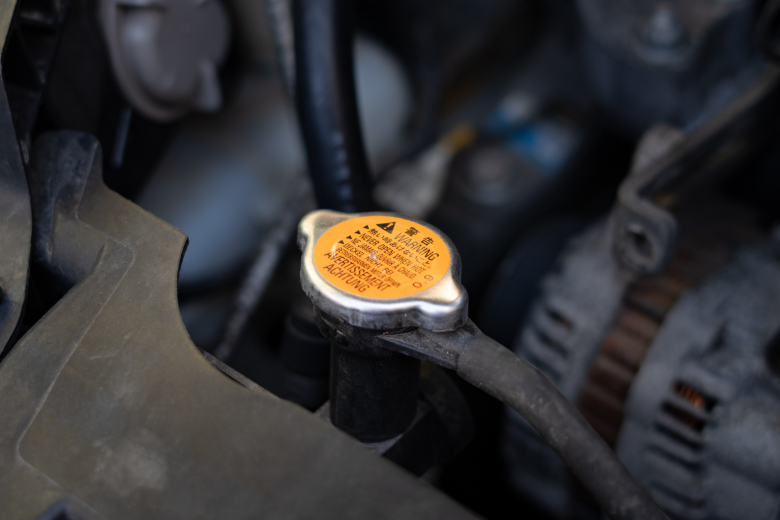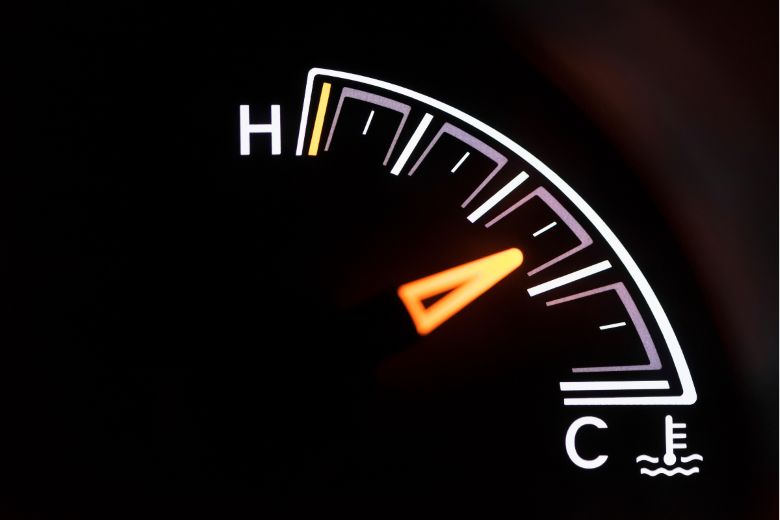
How to Choose the Right Antifreeze + Coolant
- Vehicle Maintenance
- PEAK
- August 5, 2025
Which is the best antifreeze? It's important to know how to choose. Follow this guide to learn how!
Antifreeze, also known as coolant, is a major player in your car's engine. In winter, it stops the fluids in your engine's cooling system from freezing. All year round, antifreeze protects the metal in your engine while keeping it within safe temperature ranges.
Despite its importance, drivers often misunderstand antifreeze. One common misconception is that all antifreeze is basically the same. OWI product marketing manager and antifreeze expert, Michael Marcangelo, joined us to dispel this myth and explain how to choose the best antifreeze for your car.


A quick primer on antifreeze and how it works
A little background knowledge will help you better understand how to choose the best antifreeze coolant. Let's start by taking a closer look at the main jobs antifreeze performs in your engine.
"Antifreeze is one of the vital fluids of an internal combustion engine," Michael explains. "It manages the temperature of the engine, which includes running through the radiator and engine block.
As it operates, your engine generates heat. Something needs to keep that heat in check, or your engine will get too hot and potentially cause all kinds of serious problems.
Water is an excellent heat-regulating agent, but it has limitations. First, its boiling point lies within your engine's normal running temperature range. This means that regular water would just boil away as your car runs, leaving you with no way to cool off your hot engine.
Second, water can freeze in winter, expanding as it turns to ice. If this happens in your engine, damage will follow. This is where antifreeze gets its name: it is specially formulated to remain in a liquid state even when outdoor temperatures are at their lowest.
Antifreeze also contains special additives that prevent corrosion in your engine's cooling system. This helps your cooling system function at its best. To learn more about antifreeze and how it works, check out our primer on everything you ever wanted to know about antifreeze.
Antifreeze or coolant?
Chances are you've heard the term "coolant," and you may wonder about the difference between coolant and antifreeze. "There's very little technical difference between antifreeze and coolant," Michael says. "The two terms are functionally interchangeable."
Product labels may use "antifreeze," "coolant," "antifreeze + coolant," or some other variation. All these terms basically mean the same thing, so don't worry about them too much when comparing products.
Start by checking your owner's manual
Whenever he's asked about how to choose the best antifreeze or coolant, Michael always starts in the same place. "Our go-to answer is that you should always resort back to your owner's manual," he says. "Your owner's manual is going to dictate the type of chemistry or antifreeze you should specifically use in your vehicle."
Your owner's manual will also explain exactly how often you should change your antifreeze, and how often you should do a complete cooling system flush-and-fill.
"There's a misconception that everybody should change their antifreeze at 100,000 miles," Michael explains. "That isn't necessarily true. OEMs (original equipment manufacturers) have specific ranges and mileage claims."
For example, one car manufacturer might recommend changing or flushing your antifreeze at 60,000 miles, while another might recommend it at 150,000 miles. "The best practice is always to understand the mileage-based guidance in your owner's manual, and to change your antifreeze at that point," Michael says.


Generic vs. premium antifreeze coolants: which should you choose?
Your owner's manual will provide guidance on the type of chemistry your antifreeze should ideally have. However, generic antifreeze coolants are engineered to satisfy minimum performance requirements. This sets up a choice: Do you want to go with an economical generic antifreeze, or do you want a premium product formulated specifically for your car?
Generic coolants are labeled as suitable for "all makes, all models." They're usually less expensive, and they also eliminate guesswork since you can use them in any vehicle.
"The premium category is more for the discerning type of consumer," Michael explains. Premium products offer some performance advantages, which include:
- Optimized corrosion protection for the specific metal combinations in your car’s engine
- Superior engine temperature management
Premium products also tend to last longer, which could save you money in the long run since you may not need to top off or replace your coolant as often.
PEAK's lineup of Original Equipment Technology antifreeze coolants includes 11 different formulations. Each formulation uses unique OEM fluid technologies to deliver customized protection for specific vehicles.
Does color matter?
As you shop for antifreeze, you may notice that products come in various colors. Sometimes, these colors differ even when label claims about the coolant's properties are similar or identical. It's a common point of confusion among consumers, and it's one that Michael cleared up.
"Color is a distinguishing factor in the premium antifreeze category," he explains. "It usually relates back to the manufacturer, who has chosen a specific color to distinguish the antifreeze or the additive package originally used in the vehicle."
"If you're using an orange type antifreeze, that might be a traditional organic acid technology that has been used over the years by General Motors," Michael continues. "That antifreeze will have an additive package specific to GM engines."
While color can indicate what Michael calls "similarities between the chemistries" of various coolants, it is not by itself a reliable indicator of the type of product you should buy. Instead, Michael directs consumers back to their owner's manuals.
"When checking your antifreeze or trying to verify what antifreeze you need for your vehicle, always refer to your owner's manual," he repeats. "When in doubt, look for an antifreeze with an 'all makes, all models' claim."
PEAK offers several antifreeze products suitable for any vehicle, including standard All Vehicles antifreeze + coolant along with Global Lifetime antifreeze + coolant for all makes and models.
What about electric vehicles?
Just like traditional gas-powered vehicles, electric vehicles (EVs) need antifreeze. However, antifreeze works slightly differently in EVs, where its main job is to cool the battery rather than the engine.
Because of this, EV coolants are specially formulated. If you drive an EV, we recommend PEAK's Original Equipment Technology lineup with coverage for electric and hybrid vehicles.


Common mistakes consumers make when buying and using antifreeze
"We recently did a consumer studies project to learn about what a consumer does and doesn't understand when they look at a bottle of antifreeze," Michael says. "One of the things we found is that consumers don't always recognize the importance of a 50-50 mix."
Antifreeze coolants come in two forms: concentrates and pre-diluted mixtures. "Some people choose full strength, thinking it's automatically going to be better than a 50-50 mix," Michael says. "In reality, it's just a different type of packaging."
Concentrated antifreeze coolants must be diluted before going into your engine, with a 50-50 mix of concentrate and water being the universal standard. Never pour an undiluted concentrate directly into your vehicle. You can avoid any possible confusion by buying a pre-diluted 50-50 formulation.
Michael also talked about how consumers often misunderstand the mileage claims made on product labels. "Consumers don't always recognize these claims," he explains. "For example, if they see an antifreeze that's rated for 300,000 miles, they sometimes think it's made for vehicles with 300,000 miles on them."
In actuality, mileage claims refer to the coolant's maximum lifespan. "The mileage claim on the front of the bottle is an indicator of how long [the coolant] will last in the vehicle." In other words, a label claim of 300,000 miles means the antifreeze will maintain its performance properties for up to 300,000 miles.
Explore high-performance PEAK antifreeze + coolants
In addition to its all makes, all models and Original Equipment Technology lines, PEAK also offers advanced antifreeze coolants with powerful performance properties. These include Titanium antifreeze + coolant, a newly developed product with proprietary chemical packages that work harder to protect your engine from rust and corrosion.
Don't forget about PEAK's RV & Marine antifreeze + coolant, which is perfect if you're bound for adventure on the road or at sea.
For more PEAK performance, browse our complete lineup of antifreeze + coolant products.

